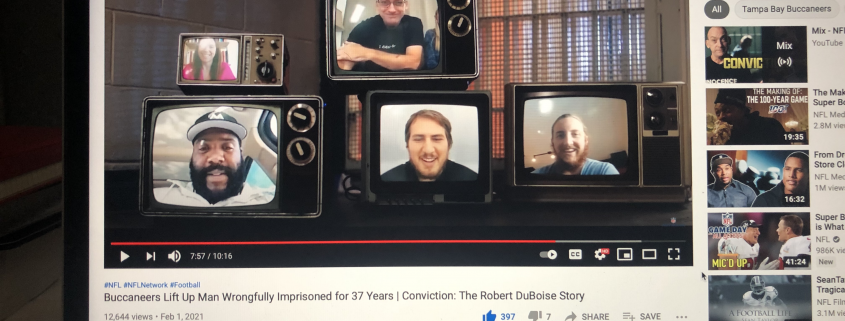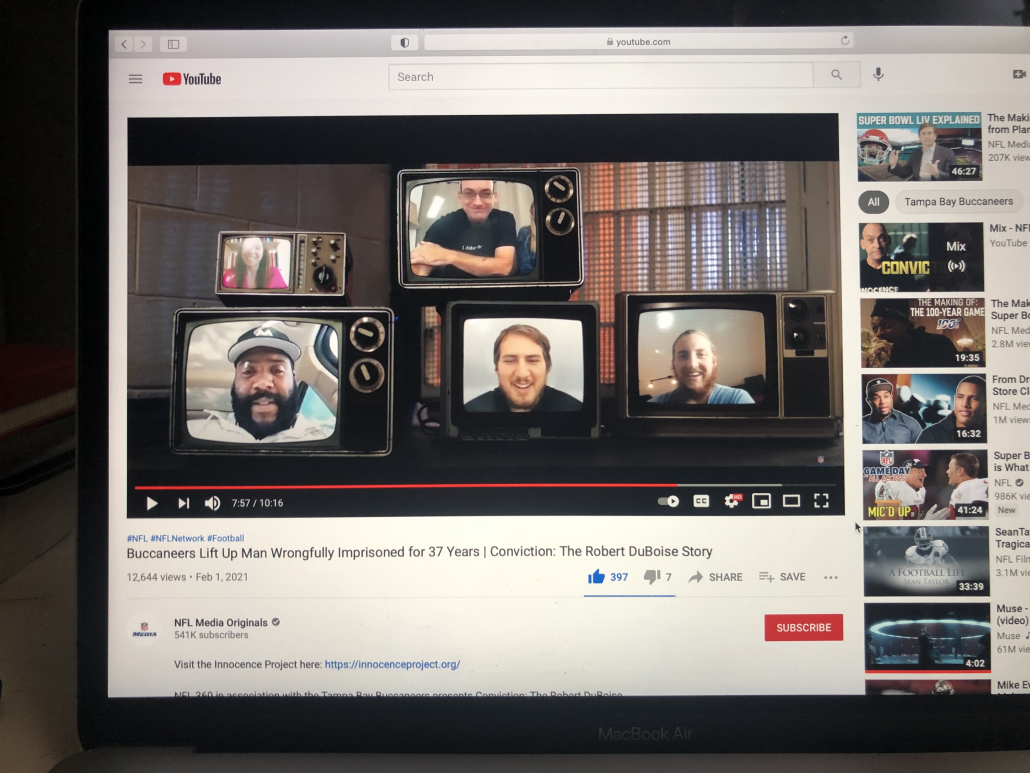Breaking Out: Tampa Bay Buccaneers highlight importance of exoneree compensation
After 37 years of wrongful incarceration, three years on death row and over 2,600 days in solitary confinement, Robert DuBoise has not been compensated by the state of Florida for the time stolen from him.
DuBoise wanted to follow in his father’s footsteps by joining the Air Force and then become a firefighter, just as his grandfather did. He also wanted to marry, have children and own a house, but this was impossible as he was confined in a dim cell for decades for a murder that he did not commit. Although nothing will remedy the time and opportunities lost, Florida refuses to atone for the mistake by offering DuBoise monetary compensation, which would help him build his new life from scratch.
On Feb. 1, the Tampa Bay Buccaneers took a stand to highlight the importance of compensation for wrongfully convicted individuals by honoring DuBoise through their 10-minute long video titled “Conviction: The Robert DuBoise Story.”
The video begins with a multifaceted montage as Jeffri Chadiha of the National Football League encourages the viewer to recall the most memorable moments of their lives — weddings, birthdays, the birth of a child — and then tells them to imagine none of it had ever happened. With this emotional start, the viewer can begin to understand what wrongfully convicted people experience and why it is so important for them to be compensated for the time and moments they lost by being wrongfully incarcerated.
Currently, 35 states, along with the District of Columbia and the federal government, allow for exoneree compensation. However, many of these states, including Florida, have shortcomings such as insufficient amounts of monetary compensation and paying exonerees privately. These states also include statutes for withholding or subtracting compensation from exonerees who were coerced into a confession or plea deal, have pre-existing felony convictions or when the case was much more intentional than a simple error. Exonerees have already suffered so much, and they should be compensated in a way that does not add any more trauma or distress.
The Buccaneers became committed to helping DuBoise after Ali Marpet, offensive guard for the team, came across an article published following DuBoise’s exoneration. After hearing DuBoise’s story, the Buccaneers reached out to the Innocence Project to help him in accordance with their social justice project. They also gave DuBoise four tickets to the Super Bowl and $25,000 to help lift him up on his feet.
“I know I didn’t do it,” DuBoise said in the video. “I just had to live with this anguish inside my heart that this is actually happening to me.”
Some states such as Florida, Alabama and Michigan offer $50,000 per year wrongfully incarcerated while other states such as California, Iowa and Michigan pay based on the amount of days each person was wrongfully convicted. The maximum compensation allowed varies by state; some set limits at $1-2 million, and others pay damages on a case by case basis. There are still 15 states that do not provide any type of compensation.
DuBoise’s story is not an isolated incident. Many individuals fail to receive compensation from states that legally allow for it, including Clemente Aguirre-Jarquin, who was exonerated in 2018 and not compensated by Florida despite spending over a decade on death row for murders he did not commit.
In the video, the Buccaneers recalled the incredible gratitude for freedom that DuBoise had. They took a moment to acknowledge milestones that they would have missed had they been wrongfully convicted: Marpet said that DuBoise had been convicted 10 years longer than he had even been alive, and Donovan Smith, offensive tackle, said that he would have missed getting his college degree, being drafted and seeing the birth of his daughter.
For DuBoise, this is not a what if situation. He did miss what would have been some of the most memorable moments of his life — birthdays, holidays and the birth of his nieces, according to Susan Friedman, Innocence Project attorney. Instead, he survived the impending fear of the death penalty, sent out letters asking for help and watched people he had gotten to know be taken away to death watch, shortly before they were executed. DuBoise spent 37 years trying to prove his innocence, something that should have never been disputed in the first place.
With this haunting message, we should take a moment to think about the greatest moments of our lives and how we would feel if they had been stolen from us. Nothing in the world would remedy the despair, hurt, anxiety and the unpreparedness from the meager reintegration programs prisons offer, but compensation money would be the means for a new start.


